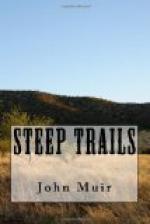Accordingly, when during the long, dreary watches of the night we roused from a state of half-consciousness, we called each other by name in a frightened, startled way, each fearing the other might be benumbed or dead. The ordinary sensations of cold give but a faint conception of that which comes on after hard climbing with want of food and sleep in such exposure as this. Life is then seen to be a fire, that now smoulders, now brightens, and may be easily quenched. The weary hours wore away like dim half-forgotten years, so long and eventful they seemed, though we did nothing but suffer. Still the pain was not always of that bitter, intense kind that precludes thought and takes away all capacity for enjoyment. A sort of dreamy stupor came on at times in which we fancied we saw dry, resinous logs suitable for campfires, just as after going days without food men fancy they see bread.
Frozen, blistered, famished, benumbed, our bodies seemed lost to us at times—all dead but the eyes. For the duller and fainter we became the clearer was our vision, though only in momentary glimpses. Then, after the sky cleared, we gazed at the stars, blessed immortals of light, shining with marvelous brightness with long lance rays, near-looking and new-looking, as if never seen before. Again they would look familiar and remind us of stargazing at home. Oftentimes imagination coming into play would present charming pictures of the warm zone below, mingled with others near and far. Then the bitter wind and the drift would break the blissful vision and dreary pains cover us like clouds. “Are you suffering much?” Jerome would inquire with pitiful faintness. “Yes,” I would say, striving to keep my voice brave, “frozen and burned; but never mind, Jerome, the night will wear away at last, and tomorrow we go a-Maying, and what campfires we will make, and what sunbaths we will take!”
The frost grew more and more intense, and we became icy and covered over with a crust of frozen snow, as if we had lain cast away in the drift all winter. In about thirteen hours—every hour like a year—day began to dawn, but it was long ere the summit’s rocks were touched by the sun. No clouds were visible from where we lay, yet the morning was dull and blue, and bitterly frosty; and hour after hour passed by while we eagerly watched the pale light stealing down the ridge to the hollow where we lay. But there was not a trace of that warm, flushing sunrise splendor we so long had hoped for.
As the time drew near to make an effort to reach camp, we became concerned to know what strength was left us, and whether or no we could walk; for we had lain flat all this time without once rising to our feet. Mountaineers, however, always find in themselves a reserve of power after great exhaustion. It is a kind of second life, available only in emergencies like this; and, having proved its existence, I had no great fear that either of us would fail, though one of my arms was already benumbed and hung powerless.




